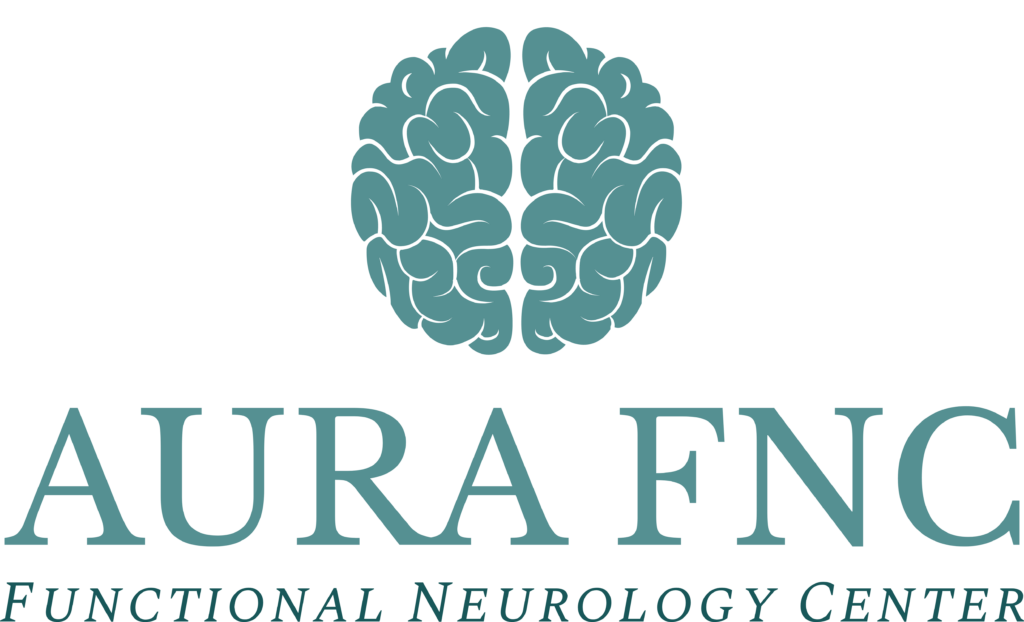Chiropractic
Chiropractic Care
Chiropractic is a form of healthcare that focuses on diagnosing and treating musculoskeletal and nervous system disorders, primarily through manual manipulation or adjustment of the spine. There are several different types of chiropractic adjustments and musculoskeletal treatments, and at Aura Functional Neurology Center (Aura FNC), we offer various styles of chiropractic treatment to fit our patient’s needs.
Dr. Diana Tyler believes in a holistic approach to wellness that combines brain-based adjustments with functional neurology to address your unique needs. While we don’t typically offer chiropractic care on its own, we do incorporate certain types of chiropractic care into our neurorehabilitation programs if the neurological disorder we are treating can benefit from Dr. Diana Tyler’s brain-based adjusting techniques combined with functional neurology concepts that are based on applied clinical neuroscience.

Dr. Diana Tyler DC, DACNB
Founder of Aura Functional Neurology Center. Dr. Diana Tyler treats patients with chiropractic care out of the Aura FNC office located in Cumming, Georgia (right outside the Atlanta area). Doctor of Chiropractic and Functional Neurologist. Graduate of Palmer College of Chiropractic and a Diplomate of the American Chiropractic Neurology Board.
Chiropractic Techniques Offered
At Aura FNC, Dr. Diana Tyler often likes to include the following brain-based adjustments and chiropractic treatments in her Intensive Neurorehabilitation Programs:
- Manual spine chiropractic adjustment therapies (Diversified and Gonstead Technique)
- Manual chiropractic traction (Y Strap Pettibon Technique)
- Extremity chiropractic manipulation

Additionally, Aura FNC offers more gentle forms of chiropractic care for our patients who might not be able to tolerate too much input, including variations of:
- Activator Method Chiropractic Technique
- Chiropractic Thompson Drop Table Technique
- Chiropractic Sacro-Occipital Technique
Aura FNC also uses traditional chiropractic spinal adjustments and stretching alongside other passive therapies to provide a more comprehensive approach to care. This may include Dr. Diana Tyler suggesting passive therapy services of:
- Trigger Point Therapy
- Instrument Assisted Soft Tissue Mobilization (IASTM)
- Electrical Muscle Stimulation (ESTIM)
- Cupping Therapy
- Therapeutic Exercise
What Chiropractors Do
Chiropractors specialize in diagnosing and treating musculoskeletal disorders, with a particular emphasis on the spine. At Aura FNC we use a variety of techniques, including spinal manipulation and functional neurology, to restore proper alignment and enhance your body’s natural healing processes. In addition to hands-on therapies, chiropractors often provide lifestyle recommendations, exercises, and ergonomic advice to support overall well-being.
By addressing the root causes of issues and promoting a holistic approach to health, chiropractors play a crucial role in helping individuals achieve optimal function and vitality. Moreover, chiropractors are adept at recognizing the interconnected nature of health, providing not only immediate relief but also empowering patients with tools for long-term self-care.
Spinal manipulation
Spinal manipulation, a key aspect of our care, involves targeted adjustments to restricted joints. This technique promotes optimal motion and alignment, often leading to pain relief and enhanced overall function.
What is a brain-based adjustment?
A brain-based adjustment aims to restore optimal alignment to the spine, promoting improved nervous system function. This not only alleviates pain but also addresses the root causes of various health issues, fostering a holistic and lasting approach to wellness, and allowing you to take control of your nervous system. Often, the spine can be manipulated in ways that support neural pathways and aid in neuroplasticity.
What happens during a brain-based adjustment?
During a brain-based adjustment at Aura FNC, Dr. Diana Tyler uses precise, controlled force, to manipulate the spine in ways that support the exercises performed during a neurological rehabilitation program. This process, alongside functional neurology assessments, ensures a personalized approach to address your unique health needs and provide support to your brain for the long term.
Why a brain-based approach?
Brain-based adjusting within the realm of functional neurology represents an innovative and integrative approach to healthcare, emphasizing the intricate connection between neurological function and musculoskeletal health. Unlike traditional chiropractic methods that solely focus on spinal alignment, brain-based adjusting places a profound emphasis on understanding and addressing the underlying neurological imbalances contributing to a patient’s condition by:
- Understanding of the brain’s intricate circuitry:
Leverage targeted adjustments to stimulate specific areas of the nervous system. These adjustments go beyond mere spinal realignment, aiming to optimize neural function and connectivity. - Tailored adjustments:
When finding asymmetrical brain activity (hemispheric), disturbances in proprioception, or other neurological irregularities, functional neurologists tailor adjustments to promote neuroplasticity – the brain’s ability to adapt and reorganize. - Modulate proprioceptive feedback:
The spine is richly innervated with sensory receptors, including mechanoreceptors, which play a crucial role in proprioception. When a chiropractic neurologist performs an adjustment, the rapid but controlled movement of the joint stimulates these sensory receptors. This stimulation activates a cascade of neural signals that contribute to the body’s awareness of its position and movement in space. - Enhance neurosensory integration:
The spine is a crucial component of the central nervous system, housing the spinal cord and numerous sensory receptors. When a chiropractic neurologist performs an adjustment, they aim to restore proper alignment and movement in the spine. This realignment can positively impact the transmission of neural signals, potentially improving the integration of sensory information.
Functional neurologists employ a comprehensive understanding of the brain’s plasticity to guide adjustments that not only alleviate musculoskeletal symptoms but also foster neurological resilience and recovery. This perspective underscores the importance of a personalized, brain-centric approach to chiropractic care, recognizing the intricate interplay between neurological function and overall health.
Chiropractic Functional Neurology
Chiropractic Functional Neurology is a specialized field within chiropractic care that focuses on the intricate relationship between the spine, nervous system, and overall brain function. Practitioners in this field utilize a holistic approach, combining traditional chiropractic techniques with neurology assessments to optimize the function of the nervous system. By understanding the complex interplay between the spine and the brain, Chiropractic Functional Neurology aims to address a variety of neurological issues and enhance overall well-being.
This discipline often involves specific exercises, sensory stimulation, and other therapeutic modalities tailored to individual patients, fostering neuroplasticity and promoting optimal brain health. Ultimately, Chiropractic Functional Neurology seeks to go beyond symptom relief, targeting the root causes of neurological conditions for a comprehensive and lasting impact on patients’ health.
Benefits of Brain-Based Adjusting
- Enhanced Nervous System Function:
Brain-based adjusting can be combined with functional neurology to optimize the function of the nervous system. The precise manipulation of the spine helps improve neural connectivity, and when complemented with neurologically targeted exercises, it promotes a synergistic effect. - Balanced Brain Function:
When combining Chiropractic Functional Neurology with brain-based adjusting, we aim to balance brain function by addressing specific neurological pathways. This integrated approach may include sensory stimulation and cognitive exercises, complementing the physical realignment achieved through chiropractic adjustments. - Improved Cognitive Performance:
We can positively impact cognitive performance through brain-based adjusting. By addressing spinal misalignments and incorporating neurological exercises, this approach may contribute to improved focus, memory, and overall cognitive function. - Optimized Movement Patterns:
Brain-based chiropractic adjustments help correct musculoskeletal imbalances, while functional neurology addresses neurological aspects of movement. Together, they promote optimized movement patterns, fostering improved coordination, balance, and overall mobility. - Comprehensive Pain Management:
Our adjustments provide effective pain relief by addressing physical misalignments while applying clinical neuroscience to help target the neural pathways associated with pain perception. The combination can offer a more comprehensive approach to pain management. - Enhanced Proprioception:
These adjustments contribute to improved joint positioning, and when integrated with our neurological exercises, they enhance proprioception—the body’s awareness of its position in space. This combined approach supports better spatial orientation and body awareness. - Holistic Stress Reduction:
Sometimes, adjustments can alleviate physical tension, while neurological rehabilitation techniques may target neural pathways associated with stress response. Together, they create a holistic approach to stress reduction, addressing both the physical and neurological components of stress. - Neuroplasticity Promotion:
Chiropractic Functional Neurology, when combined with brain-based adjustments, supports neuroplasticity—the brain’s ability to adapt and reorganize. This synergy encourages the formation of new neural connections, contributing to improved overall brain health. - Long-Term Wellness Strategies:
The integration of the adjustments we provide at Aura FNC alongside our neurological rehabilitation exercises allows for the development of comprehensive, long-term wellness strategies. By addressing both structural and neurological aspects of health, this combined brain-based approach supports ongoing well-being and preventive care.
Conditions Aura FNC Supports Using Brain-Based Adjusting
- Migraine:
Targeted adjustments in the cervical spine address misalignments and reduce tension. Functional neurology assessments identify migraine-associated pathways, guiding exercises to modulate these pathways and alleviate symptoms. - Dysautonomia:
Spinal adjustments positively influence the autonomic nervous system, promoting balance. Functional neurology rehabilitation focuses on neurological components, employing exercises to optimize autonomic function and regulate blood pressure and heart rate. - Postural Orthostatic Tachycardia Syndrome (POTS):
Adjustments focus on the spine to support optimal nervous system function, potentially influencing symptoms related to POTS such as blood circulation and posture regulation. Specialized assessments identify neurological factors contributing to POTS symptoms. Tailored exercises and therapies aim to enhance autonomic function, promoting better regulation of heart rate and blood flow. - Traumatic Brain Injury (TBI):
Adjustments address trauma-induced misalignments, supporting recovery. Functional neurology assessments identify deficits, and guide exercises to rehabilitate neural pathways, improving cognitive and motor functions. - Long COVID:
Adjustments address musculoskeletal symptoms. Functional neurology contributes to managing neurological symptoms, utilizing exercises to address cognitive challenges associated with Long COVID. - Neurodevelopmental Disorders:
Adjustments address structural misalignments impacting sensory processing. Functional neurology utilizes tailored exercises and sensory interventions to target specific neurological challenges, promoting neuroplasticity and functional improvements.
Risks of Chiropractic Adjusting
While chiropractic care is generally safe, Dr. Diana Tyler takes a meticulous approach to discussing potential risks comprehensively during your consultation. This commitment to transparency allows you to make informed decisions about your care, understanding any potential considerations related to your specific health needs.
Our practitioners at Aura FNC are adept at addressing any concerns you may have, fostering an environment of trust and personalized care.
